Cannes 2018 Days 5 & 6: Drugs, Farce & The Best Film Of The Festival So Far
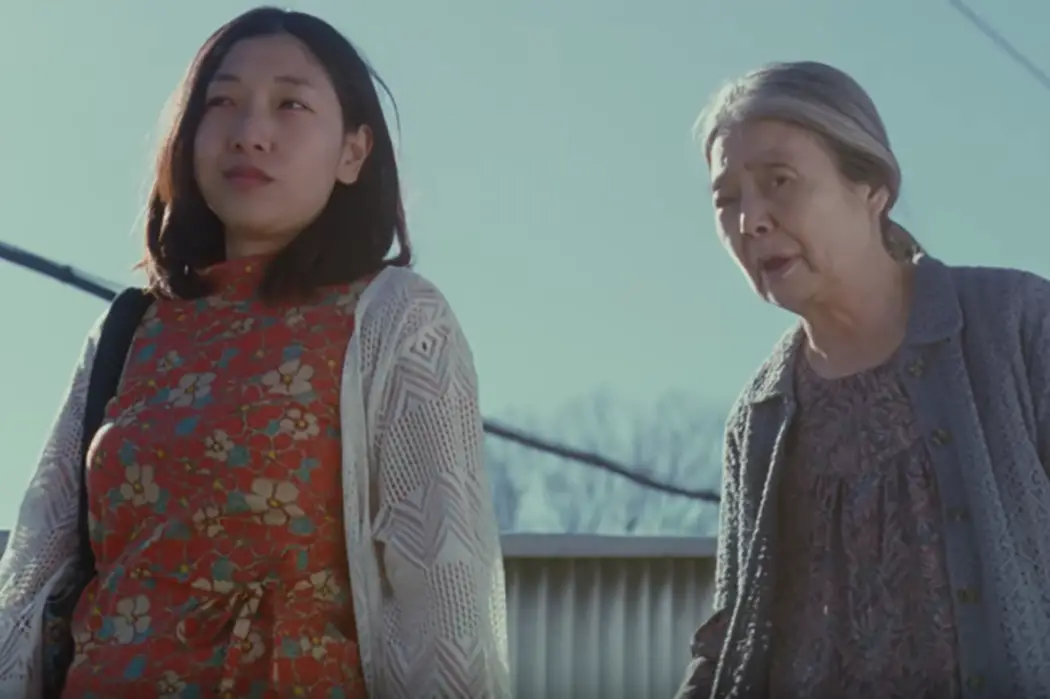
Gus is a 3rd year English Lit and Creative Writing…
Now truly into the sway of the festival, my attention turns away from ‘How the hell can I survive Cannes?’ and towards ‘How the hell am I surviving Cannes?’. Sleep (or lack thereof) is an issue and was always going to be: I’ve caught myself accidentally drifting off during screenings, hallucinated moments in films before realising that my own sleep-deprived brain was doing the work for me, and have treated a couple of slow-moving films as opportunities for 2-hour naps.
So if none of the following write-ups for days 5 and 6 at Cannes make sense, there’s the reason why. Here they are anyway, featuring the latest from enfant terrible Gaspar Noé, Nicolas Cage wielding a chainsaw, a funky Spike Lee joint, and even the best film of the festival (so far).
Climax (Gaspar Noé)

Gaspar Noé isn’t treading new ground with Climax, a lurid experience featuring thumping music, crazed camera movements and a whole lotta sex talk, but he has achieved the impossible: making a film about a bad LSD trip – which we never actually see the effects of – genuinely thrilling. It doesn’t boast nearly the same amount of psychedelia as Enter the Void, for instance, but it trades visual distortion for nightmarish scenarios as a millennial dance troupe try to survive spiked sangria.
They are managed by Sofia Boutella’s Selva, the closest we get to a lead character. She’s the first to notice something’s afoot, and also the poor victim of a Possession-influenced frenzy. Joined by an array of fresh-blooded figures – including lecherous men, an incestuous couple, and, alarmingly, a young boy – and framed against a French flag that takes up much of the background, these dancers represent their nation in miniature. Well, sort of – it’s a skin-deep reading, Noé much more interested in the machinations of this descent into hell.
And as the night goes on, it’s difficult to differentiate dance from delirium. The camera obliges, drifting through the drugged-up bustle, or flipping on its axis to represent an upturned state of reality. Noé keeps affairs constantly moving, and so enervation is limited; in fact, it’s the earlier sequences, before the opening credits appear, that may test the patience. Once Climax finds its rhythm – and with a catalogue of ’90s dance music to choose from, that’s easy enough done – it doesn’t let up.
Murder Me, Monster (Alejandro Fadel)
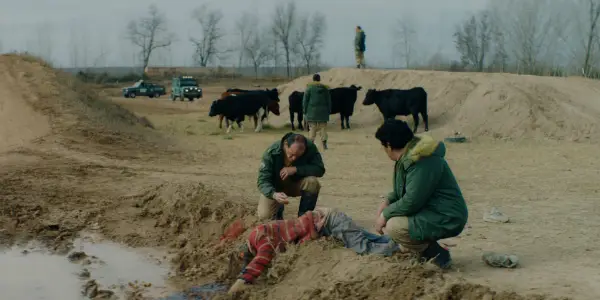
With a narrative that criss-crosses a creature feature in the same vein as The Untamed with a procedural detective drama, there’s no film quite like Murder Me, Monster at Cannes this year. Perhaps this is for good reason – Fadel’s film is strung together with a grimy atmosphere in place of cogent storytelling – but the reveal of the titular beast feels like a build-up worth waiting for.
The wait is rather arduous, though; Murder Me, Monster commits the worst crime a detective story can: making its detective unbearable to watch. Played by Victor Lopez, Cruz is a blank palette with nothing in the way of characterisation, broodily staring into the distance when he should be at least somewhat agitated by affairs. If it’s any consolation, the knots of motorcycle apparitions, forced alliteration and abstract geometry that make up the case’s impressionistic set of clues is enough to leave anyone nonplussed.
He also has a frazzled murder suspect to deal with, whose foreboding remarks on the voices inside his head are both mumbled and jumbled. It adds to the confusion alright, but it’s dubious whether much of the narrative’s first-half incoherence is a result of Fadel’s intentions, or his mishandling of the material. Either way, it’s frustratingly difficult to make out the story or subtext through an atmosphere so thick even its monster can’t penetrate it.
Mandy (Panos Cosmatos)
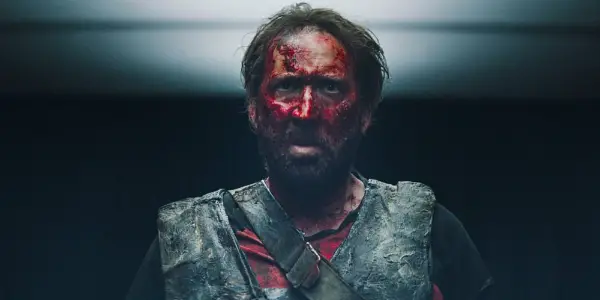
Here’s a great counter-argument to the claim that Nicolas Cage needs to stop over-acting: Panos Cosmatos’ Mandy, which sees the man take revenge on a demonic clan after they drug and murder his wife (Andrea Riseborough) for, uh, whatever reason. ‘They weren’t making any sense!’, Cage exasperates to a friend with a harpoon gun. We know Nic, we know.
He goes ham on a vodka bottle, engages in a chainsaw fight, and snorts cocaine midway through battering a skull in – this is midnight movie magic, spattered with blood and neon. It’s slow-going in the first half, planetary pillow talk knowingly preposterous (though not developed enough to create a tangible connection between Cage and Riseborough), but once Cage takes center stage, all hell breaks loose.
Cosmatos has a wonderful handle on one-liners here, but Cage is such an iconic gun-slinging protagonist through his physicality rather than his words. He gives his character an infectious manic energy that sustains the film’s second half – what is essentially one long, gory set piece. It’s not nuanced, but it needn’t be: watch Mandy with an enthusiastic audience and it’s impossible not to be swept away in the carnage.
Shoplifters (Hirokazu Kore-eda)
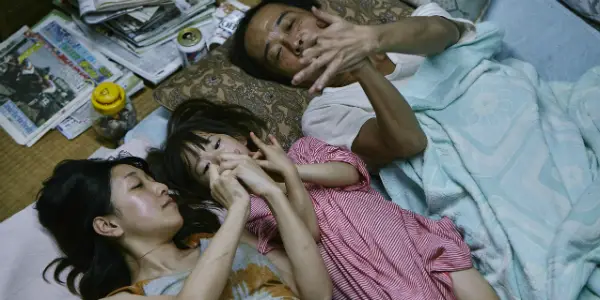
Here we have this year’s first truly great film of Cannes. Centered around a ragtag family – that they are unrelated by blood hardly matters – who steal stuff and are overstuffed into a stuffy house, Kore-eda’s Shoplifters knocks the stuffing out of you.
Its power arises from an unassuming plot progression that begins relatively twee (the family rescue an adorable little girl from an abusive family) but transitions into a third act that layers revelation upon revelation and hits like a sledgehammer. Shoplifters posits two moral conundrums: “what defines a ‘family’?” and “Are the parents in this particular family good people?” Of course, Kore-eda isn’t interested in answering these quandaries for you, but substantiating and applying nuance to flesh out what would otherwise be a slight narrative.
There’s a capitalist-damning undercurrent that rises to the surface during shots of the family’s threadbare apartment; a crowd of ex-strangers crammed together, connected by the situation they find themselves in. In a less composed director’s hands, this would be sentimental guff. Here, it’s potent.
En Liberte! (Pierre Salvadori)
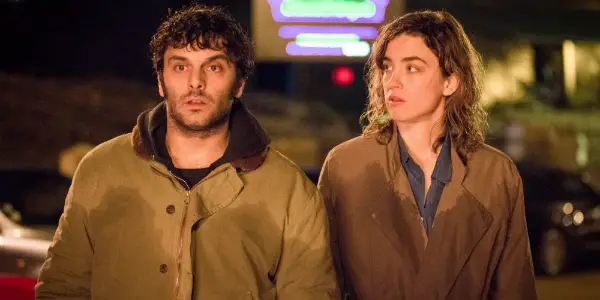
A welcome throwback to the traditional French farce amid the otherwise staunchly serious roster of Cannes, Salvadori’s En Liberte! follows Yvonne (Adèle Haenel), a police detective who finds out her idolised and recently deceased husband was in fact a crooked cop. Cue a series of misunderstandings as she manages to free Antoine (Pio Marmaï) – who was framed by her husband for a robbery he didn’t commit – while she mismanages a workplace romance with colleague Louis (Damien Bonnard).
There’s something very cosy about proceedings, which play out as pastiche. Salvadori’s film is hampered somewhat by gender politics that also recede into the old-fashioned ideal that a woman needs a man, but there’s enough comedy to paper over the cracks. Gags range from pithy one-liners to well-timed slapstick, and there’s a hilarious running gag in which a murderer confesses to and is dismissed by Louis, who’s more focused on Yvonne in the adjacent office.
It’s frantic stuff, slight and cheesy but endearingly French and undeniably funny. There’s an emotional core between Yvonne and her son largely kept at the fringes, but its bookending of En Liberte! sustains the film’s charm well after its closing credits.
Asako I & II (Ryūsuke Hamaguchi)
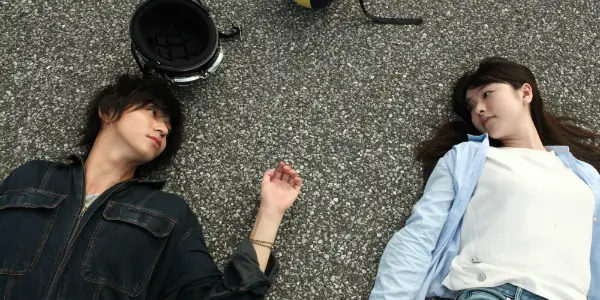
Ryūsuke Hamaguchi’s follow-up to 2015’s acclaimed Happy Hour is a romanceless dud with a clumsy conceit. The eponymous Asako (Erika Karata) hastily falls for Baku (Masahiro Higashide, who’s having a bad year following the diabolical Foreboding) – he’s a hammed-up bad boy and a bit of an asshole, so abandoning Asako in the middle of the night is keeping in character.
Cut to a few years later, where Asako – now relocated to the city – stumbles across a Baku-identical in the form of Ryohei (also Higashide, and also caricaturishly performed), who’s dull and safe; the opposite to Baku, essentially. Once you figure out this fascinating concept’s obvious allegory – of letting go of old flames, or the inability to do so – the narrative becomes laborious, a series of predictable checkpoints winding its way to an inevitable conclusion. At least the duplicates have personalities – however thinly designed – to fall back on: Karata has the thankless task of bringing Asako’s void of a personality to life, characterised solely by her relationships with Higashides’ characters.
Framed in an ugly overcast wash, and with a plotting that, if you strip away all its bells and whistles, represents a standard rom-com arc (though devoid of the ‘com’), there’s frankly little to appreciate about this overlong slog. It’s a frustrating watch: with such an interesting conceit at play, why choose the most obvious route possible?
BlacKKKlansman (Spike Lee)
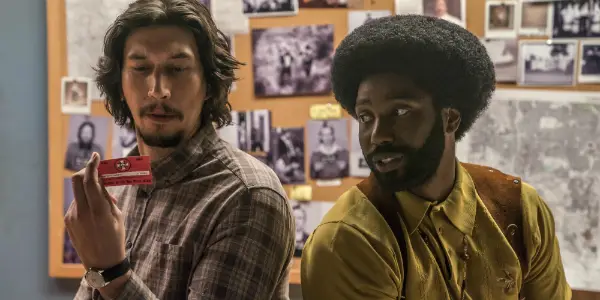
I wouldn’t say Spike Lee’s back – Chi-Raq marked his return to form – but he continues his hot streak with the remarkably entertaining and provocatively-titled BlacKKKlansman, which loosely retells the genuinely true story of a black undercover officer who infiltrated the KKK during their ascension. John David Washington plays our protagonist, Ron Stallworth, while Adam Driver plays his on-the-field representative. Their operation is testy, though Lee – aside from a preposterous Jew lie detector scenario – doesn’t quite capitalise on the potential for tension.
What BlacKKKlansman lacks in suspense, however, is made up for with ferocious comedy and a suitably blunt message that has Lee’s anger at current-affair politics (there’s more than one Trump allusion at play) seeping through the seams. This is urgent filmmaking that rides on its boiling temperament to startling effect. Lee acknowledges the power of cinema as a political tool – the KKK have Birth of a Nation to thank for their get-up, while Ron and his activist girlfriend list off blaxploitation icons – and here he’s engineered a rallying cry to an inert American populus.
It’s a shame, then, that the resolution to the operation hinges on a KKK member’s mistake rather than the actions of Stallworth himself – it undermines the message of retaliation and ‘power to the people’ that Lee encourages – but the closing images, in a powerful, instinctive move, do away with allegory and let shocking footage do the talking. Anger is bound to yield erraticism, which may explain a few flaws, but it’s vital to BlacKKKlansman’s political suckerpunch.
What are your thoughts on any of the films mentioned?
Does content like this matter to you?
Become a Member and support film journalism. Unlock access to all of Film Inquiry`s great articles. Join a community of like-minded readers who are passionate about cinema - get access to our private members Network, give back to independent filmmakers, and more.
Gus is a 3rd year English Lit and Creative Writing student who loves everything film and still doesn't understand why he didn't study that instead. He is the co-editor for Venue, the arts supplement of his Uni's newspaper, and has written for Little White Lies, ScreenRant, Dog and Wolf, BritFlicks and Outline Norwich.













